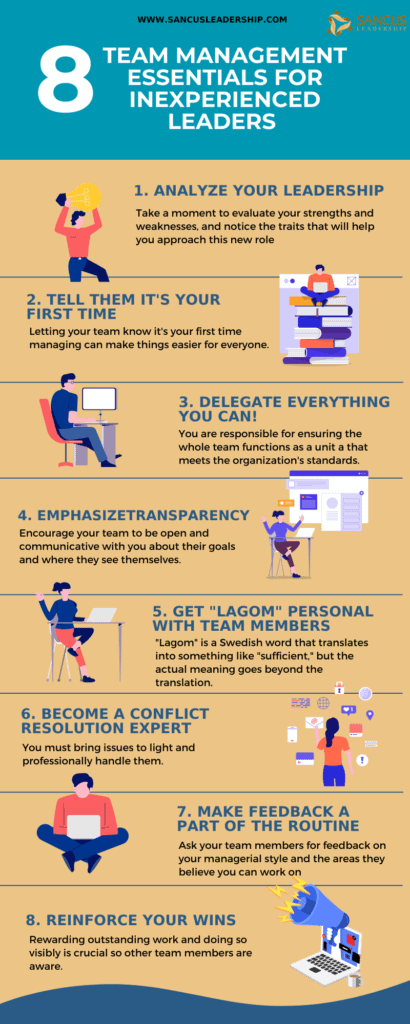Confident managers make it seem like leading a team is easy. But every leader had a moment where it was the first time they were in charge of a team. Most of us felt nervous and anxious, and we thought, “I better not screw this up so they think I’m a bad boss.” Maybe you have these thoughts right now? So how do you best lead a team as a new leader?
To lead your first team successfully (without prior experience as a manager). You must understand your weaknesses and strengths, be transparent with members, and ensure the team knows you are open to feedback.
Twelve years ago, when I ran my first small team, I was terrified; what if I make a mistake? What if I don’t know the answers? What will they think of me? If you have ever had thoughts like this, you are in the correct place.
Today we will discuss how to improve your chances of having success with your first team.
Team Management Essentials for Inexperienced Leaders

Finding yourself in charge of a team without experience frightens most of us. Fortunately, new managers can learn about their roles by studying their predecessors’ mistakes and successes. However, considering a managerial role is essential at various organizational levels, there’s a blueprint for going about it.
Here are some aspects you should focus on:
1. Analyze Your Leadership

Take a moment to evaluate your strengths and weaknesses, and notice the traits that will help you approach this new role. By analyzing yourself, you can spot potential flaws that may hinder being a team leader and work on them early on.
You also get to see what you’re good at, which, If you exploit it correctly, will make you a more effective and confident leader.
For example, if you’re good with group communication, you can rest assured that you will quickly get along with team members. It also means you can quickly form bonds with your team members, helping you understand their strengths and weaknesses.
However, let’s say you are like me, and you hate routine logistical tasks, and you know that from time to time, you tend to avoid them in favor of something you think is more important. If you let your team know about these weaknesses, They can help remind and support you in those duties.
According to a study from 2015, allowing your team to see you have weak spots will also build trust.
You also want to assess how your organization works, its values, and its strengths. This analysis will give you a grasp of the strategy you should employ while managing. By understanding your organization thoroughly, you can also understand how to allocate different assets while managing your team.
Understanding the organization sets you up for reaching your targets, and hitting the team goals means you are competent as a leader, and competency is one of the pillars of intra-team trust.
2. Tell Them It’s Your First Time

Whatever you do, don’t apply the method of “fake it till you make it.” I have seen so many leaders try this, but sooner or later, your team will find out that you are fake, and when they do, you will have lost all the trust you’ve been trying to build, and your performance will plummet.
Whatever you do, don’t apply the method of “fake it till you make it.”
While it may seem weak, letting your team know it’s your first time managing can make things easier for everyone. The members are more likely to forgive your mistakes if they know it’s your first time in this new role.
However, there’s a caveat – some members may want to test you in this role and can challenge your authority in some issues. This is OKAY and is to be expected; after all, they want to ensure they have a competent boss who will take them toward their individual goals.
Be open and ask questions, but when it is time to decide, You need to be firm and decisive.
3. Delegate Everything You Can!

The most challenging part of leading a team for the first time is the mindset shift that needs to happen when you first step into the role. Remember that you were selected for your ability in the organization and the contribution you have made. However, now that you’re managing a team, success is based on something other than your efforts.
Now you need to transition from being excellent at doing to being excellent at leading. This is a totally different skill set.
Now you need to transition from being excellent at doing to leading.
Results depend on team efforts and not on any single member. As such, you are responsible for ensuring the whole team functions as a unit and churns work that meets the organization’s standards. You must recognize the change in your role and adapt accordingly. This change, like your work, can take some getting used to.
Results depend on team efforts and not on any single member.
Many new managers need help to delegate work and try to do specific tasks themselves. They start micromanaging projects by giving members roles and interfering in how their team carries out these roles. The tendency for new leaders to micromanage
While having high standards is a good thing, wanting things to be perfect or just how you’d like will surely kill your career as a manager. It would be best to avoid the narcissistic tendency of thinking you are the only one who can do this to standard.
Trusting your team to carry out their specific roles without your interference is crucial.
Trusting your team to carry out their specific roles without your interference is crucial.
The managerial position allows you to bypass unnecessary measures or complete the project more efficiently if you can think of one. This power will enable you to get work done by delegating to members. And you must learn to share the workload if you want to be successful as a team manager.
Delegating work is an essential skill to possess as a manager and requires practice to understand. Delegating doesn’t mean handing off a large chunk of work to various team members.
Instead, you sit with your team and outline your project together. Then, you must assign specific tasks to each member, giving them the tools and authority necessary to carry out these tasks. While controlling everything is tempting, allowing team members to lead specific processes is crucial for effective management.
You tell them what to do and when it should be done, but they decide how it should be done since they are the ones who will interact most closely with the problem.
4. Emphasize Transparency

One of the best things you can do as a new manager is to be transparent about your goals and the organization’s goals. And in turn, encourage your team to be open and communicative with you about their goals and where they see themselves. Emphasizing transparency is one of the quickest ways to build trust within the team and ensure they are engaged with the work.
Emphasizing transparency is one of the quickest ways to build trust within the team and ensure they are engaged with the work.
Aside from the trust factor, transparency ensures team members know what they’re working towards. Without transparency, most individuals perform their role in the team without understanding how it fits into the bigger picture.
And when someone needs help seeing their contribution and how it ties into an overall goal, it can be hard to stay motivated. Being transparent also means telling the team what you hope to achieve in the coming year.
When your team knows your goals as a manager, they can work together to help you achieve them. And if you take the time to learn their personal goals and motivations, they will feel part of the bigger picture – an essential factor for success in any project.
Being transparent also means letting team members know when you mess up instead of keeping it under wraps and hoping no one notices. Managing this way will encourage your team members to be open about their mistakes so everyone can work towards a solution without feeling bogged down by guilt.
5. Get “Lagom” Personal With Team Members

“Lagom” is a Swedish word that translates into something like “sufficient,” but the actual meaning goes beyond the translation. It’s when situations are hard to measure but need to be centered or balanced. Something that is “lagom” is “just enough,” but in a perfect way.
Most new leaders I have trained make the mistake of taking on the role of a superior and creating emotional distance between themselves and team members. This may seem an effective strategy at the outset, as you want to avoid being too emotionally involved with your team.
However, creating this distance can make you seem cold and uncaring, even unapproachable. Instead, it would help if you strived to create an environment where open and honest communication is valued. Of course, you must set personal boundaries as this is a work environment, and you are the manager.
However, there’s a difference between having boundaries and being too closed off and unavailable. While your team should respect you, they must also feel you can be trusted when discussing their issues at work.
If possible, schedule regular one-on-one meetings with team members so you can learn more about them. During these sessions, I encourage you to discover their goals and motivations and where they see themselves in the organization.
Here, you can also ask them for feedback on how you can help them better as a manager. Finding out what your members need from you has two benefits:
- You can provide them with the assistance they require in a timely manner.
- You can understand what’s holding them back and help them so they contribute more to the team.
- Truly listening to someone is a great way to build a relationship.
Scheduling personal meetings will also help you understand the strengths and weaknesses of various members and their psychological makeup to an extent. This knowledge allows you to delegate work in a way that plays to individual members’ strengths.
By understanding their tendencies, you can eliminate the mistake of putting people in roles that may not naturally suit them.
Additionally, knowing individual motivations will allow you to help your team members achieve their goals. And when you help each member, they are motivated to carry out their duties more efficiently since their goals are also considered necessary.
6. Become a Conflict Resolution Expert

Issues between team members or against the new manager can quickly devolve into full-blown conflicts that can destroy enthusiasm and prevent a project from progressing. And as a manager, you must bring issues to light and professionally handle them.
The issue may be between two members of your team or a problem one of your team members has with your management style. If you sense a problem, bring it up and discuss potential solutions. Allowing an issue to fester can breed resentment among team members and lead to unnecessary conflict.
When resolving a conflict, you need to focus more on understanding the problem than on solving the problem. If you become good at understanding problems, the solutions will appear automatically.
As a manager, you have the authority to delegate tasks and a duty to know if team members are happy. By proactively bringing up issues professionally, you eliminate the passive-aggressive tendencies that many organizational teams tend to exhibit between members.
Resolving conflict also helps bring different team members closer, increasing overall productivity.
Constructive conflicts are a means to building high-performing teams!
7. Make Feedback a Part of The Routine

While you want to do it sparingly (usually once per week is too much), consider setting a time (I recommend once a month) to discuss team efficiency shortcomings when you meet with team members. Here, having an open mind and trying not to take things personally is crucial.
Ask your team members for feedback on your managerial style and the areas they believe you can work on. Conduct these meetings after a project is complete, so you can run through the project and figure out areas that may need tweaking.
Remember to ask all team members, not only the outspoken ones or those whose opinions you value the most. You may be surprised at the feedback from the more silent members of your team, which can be crucial to leveling up as a manager.
I have gotten my most productive feedback from the people I like the least and who are the most different from me.
Conducting these feedback sessions shows your team that their opinions matter, which is great for motivation and cooperation. You also gain insight into your managerial style and how the team functions. This information will allow you to make the necessary changes.
8. Reinforce Your Wins

As a manager, it’s crucial to have team members feel like winners. For example, when the team completes a project, it’s a good idea to go through exactly and precisely what they did that was appreciated by you and that led to success.
Rewarding outstanding work and doing so visibly is crucial so other team members are aware. Publicly acknowledging a team member helps raise their morale while indicating to other members that rewards await those who do the work. But aside from team celebrations, it’s crucial to reward individual team members when they show promise or complete specific tasks.
Of course, it’s best to have a system to ensure these recognitions and rewards are given on time and distributed in a way that doesn’t build nepotism or unjust favoring of particular individuals.

Final Thoughts
While managing a team for the first time can seem like a daunting experience, it’s also exciting when you consider the new skills you will learn and how your career will grow.
Being a small team leader is the most exciting and rewarding thing I have ever done. It is also the hardest thing I’ve ever done, but it has all been worth it.
Enjoy!



